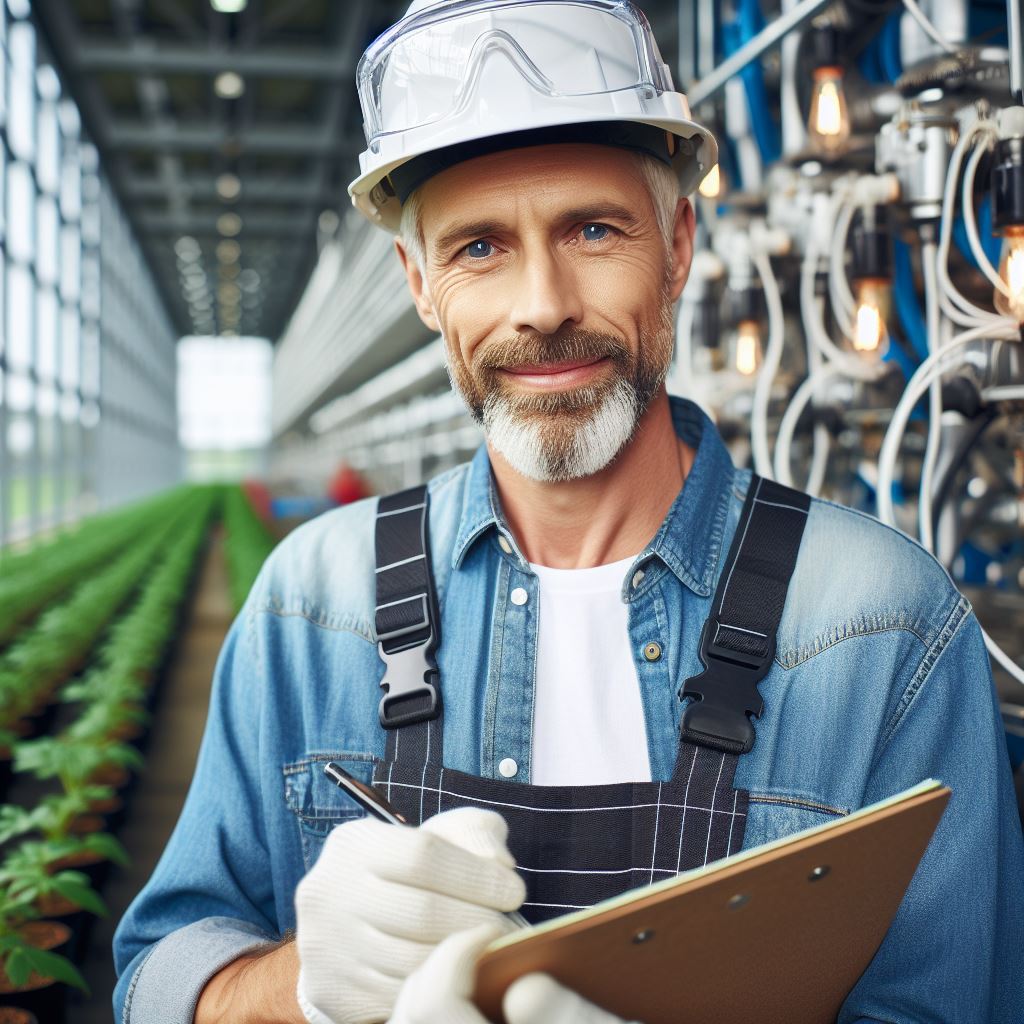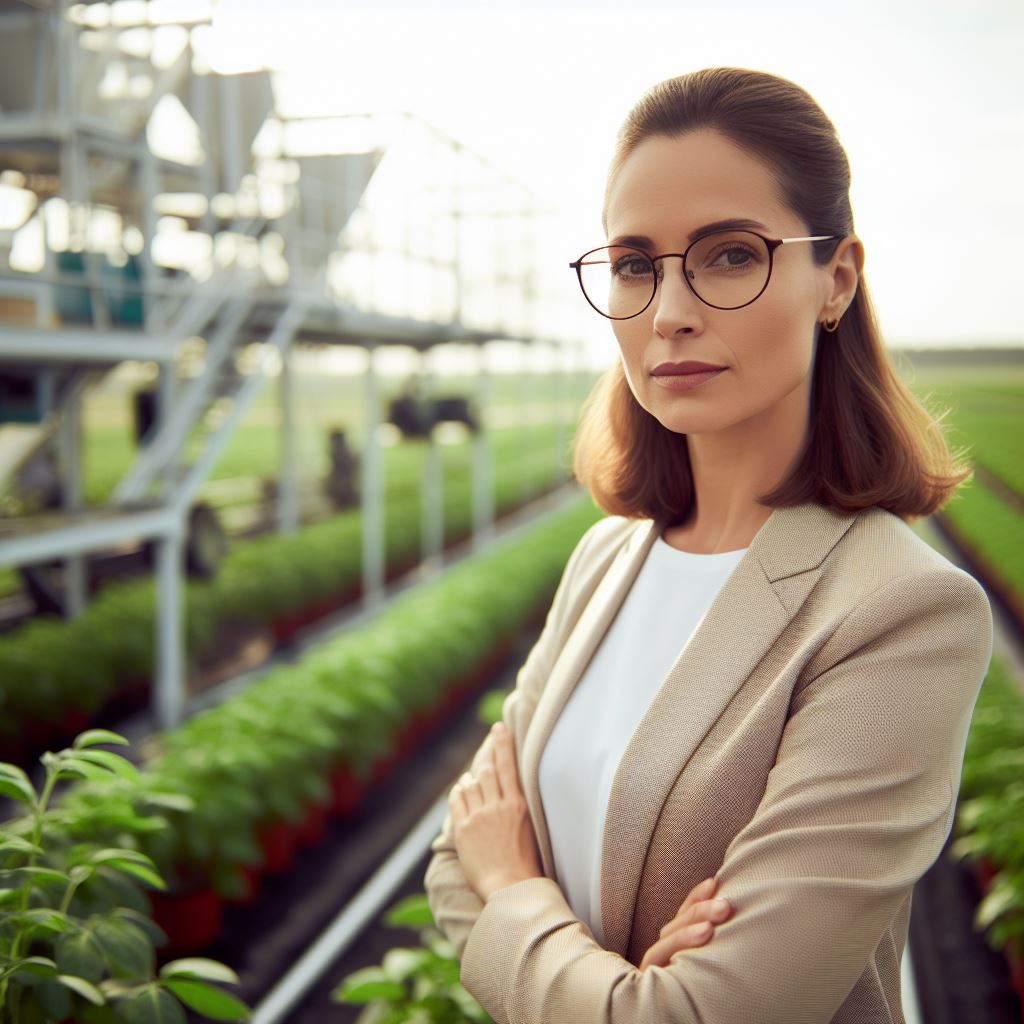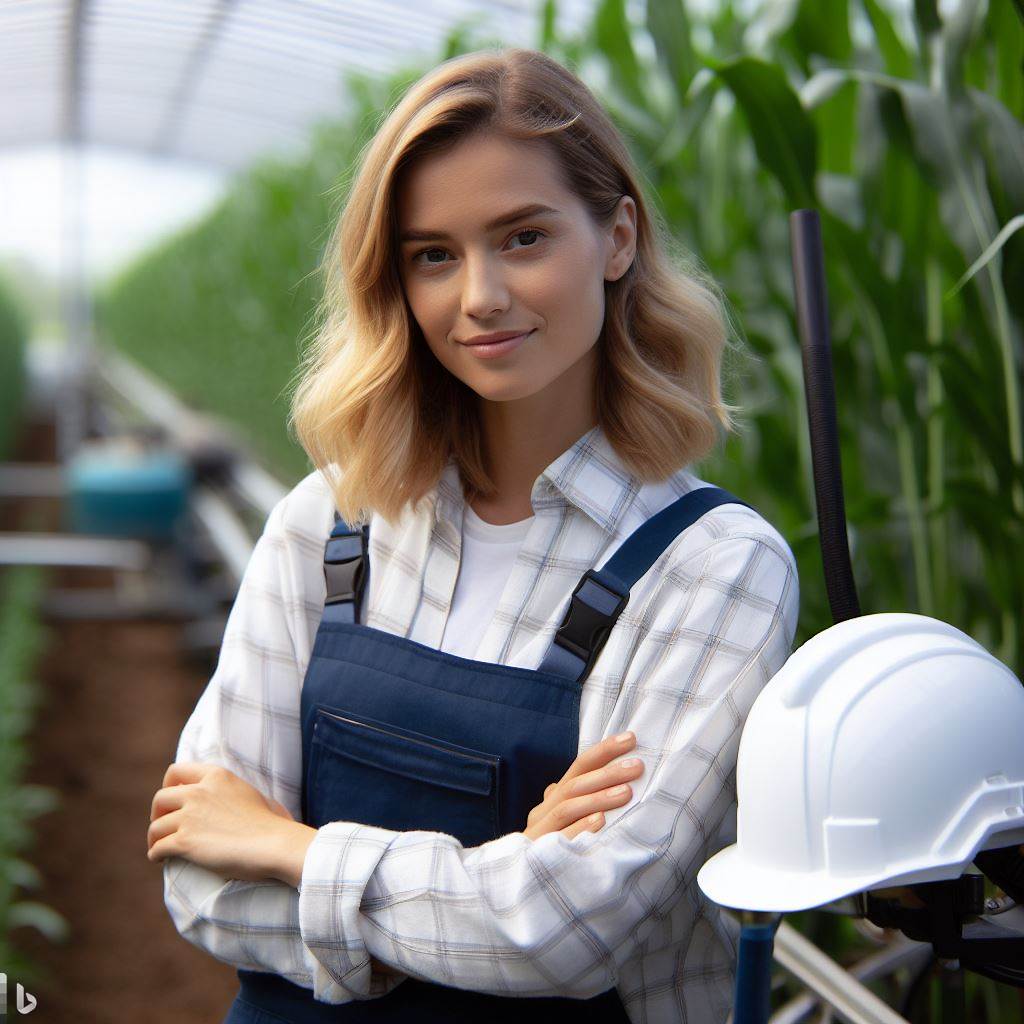Introduction
Picture a world where sprawling fields are not just a testament to nature’s bounty but also to human ingenuity.
Farming in the United States has always held a position of paramount importance, serving as the lifeline of food production, economic vitality, and rural development.
In this blog post, we embark on an exploration of the indispensable role played by US Ag Engineers in shaping the future of farming.
As we journey through the vast American farmlands, we will uncover the profound impact of these engineers.
Engineers who, with their innovative solutions and unwavering expertise, are steering agriculture toward a sustainable, technology-driven, and highly efficient future.
Together, we will delve into the heart of American farming, where engineers emerge as the architects of a brighter, more productive, and environmentally conscious agricultural landscape.
Join us as we unravel the fascinating story of US Ag Engineers and their extraordinary contributions to the world of farming.
The Current State of Agriculture in the US
- Statistics on the agricultural industry in the US
- Challenges faced by farmers
- Technological advancements in agriculture
Agriculture plays a vital role in the US economy, providing food and raw materials for various industries.
The current state of agriculture in the country can be understood through analyzing statistics, the challenges faced by farmers, and the technological advancements in the field.
Statistics on the agricultural industry in the US
The agricultural industry in the US is significant, contributing to both domestic and international food supplies.
According to recent statistics:
- The US is the world’s largest exporter of agricultural products, accounting for a significant portion of global trade.
- Around 900 million acres of land are used for agriculture in the US.
- The agricultural sector provides employment to over 2 million Americans.
- Major crops include corn, soybeans, wheat, cotton, and rice.
- Livestock production is also prominent, with the US being a leading producer of beef, pork, and poultry.
Challenges faced by farmers
Despite the importance of agriculture, farmers face several challenges that can hinder their productivity and profitability. These challenges include:
- Climate change and unpredictable weather patterns can affect crop yields and livestock production.
- Fluctuating market prices and trade policies impact farmers’ incomes and their ability to plan for the future.
- Aging farming population and the lack of young farmers entering the industry pose concerns for its sustainability.
- Access to affordable credit and loans can be limited, making it difficult for farmers to invest in modern equipment and technologies.
Technological advancements in agriculture
In recent years, agriculture has experienced significant technological advancements that have transformed farming practices. These advancements include:
- Precision farming techniques, such as GPS and remote sensing, allow farmers to optimize the use of resources and increase yields.
- Biotechnology and genetically modified crops have improved plant resistance to pests and diseases, enhancing overall productivity.
- Automation and robotics have revolutionized various farming tasks, such as planting, harvesting, and even milking cows.
- Big data analytics and artificial intelligence help farmers make more informed decisions about pest management, irrigation, and crop rotation.
- Vertical farming and hydroponics enable year-round production of crops in controlled environments, reducing reliance on traditional farmland.
Basically, the current state of agriculture in the US is influenced by statistics, challenges faced by farmers, and technological advancements.
While agriculture continues to be a crucial industry, farmers must overcome obstacles and embrace innovation to ensure long-term sustainability and meet the demands of a growing population.
The Role of Ag Engineers in Modern Farming
Definition of Ag Engineering
- Ag Engineering involves the application of engineering principles and technology to agriculture.
- Ag Engineers are responsible for designing, developing, and implementing various agricultural systems and equipment.
- They combine their knowledge of engineering and agriculture to solve complex problems in the farming industry.
- Ag Engineering plays a crucial role in improving the efficiency, sustainability, and profitability of farming practices.
Key responsibilities of Ag Engineers
- Designing and constructing agricultural machinery and equipment for efficient and safe farm operations.
- Developing innovative technologies to enhance crop production, irrigation systems, and livestock management.
- Integrating automation and robotics into farming processes to increase productivity and reduce labor requirements.
- Creating and implementing environmental control systems to monitor and optimize growing conditions.
- Conducting research and experiments to improve the overall performance and reliability of agricultural systems.
- Collaborating with farmers, scientists, and other professionals to address specific farming needs and challenges.
- Ensuring compliance with regulations and safety standards to protect the environment and farm workers.
How Ag Engineers contribute to the efficiency and productivity of farming operations
- Optimizing farm layout and equipment placement to maximize space utilization and minimize resource wastage.
- Developing precision agriculture techniques to precisely distribute inputs, such as fertilizers and pesticides.
- Implementing data-driven decision-making tools and systems to enhance farm management practices.
- Creating efficient irrigation and drainage systems to conserve water resources and prevent soil erosion.
- Designing and implementing automated harvesting, sorting, and packaging systems to increase efficiency and reduce post-harvest losses.
- Introducing smart farming technologies, such as remote sensing and IoT devices, for real-time monitoring and control.
- Enhancing crop yields and quality through the development of advanced breeding and genetic engineering techniques.
- Improving animal welfare and productivity through the design of comfortable housing and automated feeding systems.
- Implementing sustainable agricultural practices, such as renewable energy integration and waste management strategies.
Ag Engineers play a vital role in modern farming by applying engineering principles and technology to optimize agricultural practices.
Through their innovative designs and technologies, they contribute to the efficiency, productivity, and sustainability of farming operations.
Ag Engineers devise innovative solutions, from advanced machinery to precision agriculture, to address global food demands while reducing environmental impact.
Their expertise and collaboration with farmers and scientists pave the way for a more technologically advanced and sustainable future of farming.
Read: US Breeding Regulations: What New Breeders Must Know
Technology and Innovation in the Agricultural Sector
Overview of technological advancements in agriculture
In recent years, the agricultural sector has witnessed remarkable technological advancements that have transformed the way farming is done.
These innovations have greatly optimized productivity, efficiency, and sustainability in the industry.
Technological solutions have been harnessed to address various challenges faced by farmers, such as limited resources, climate change, and the need to meet the growing demand for food.
These advancements encompass a range of areas, including precision agriculture, automation, data analytics, and biotechnology.
Examples of cutting-edge technologies used in farming
One of the key technologies revolutionizing agriculture is precision agriculture.
This approach utilizes advanced sensors, GPS mapping, and autonomous machinery to optimize crop yield while minimizing resource inputs.
For instance, farmers can precisely apply fertilizers and pesticides based on real-time data, reducing waste and environmental impact.
Robotic automation is another cutting-edge technology gaining rapid momentum in farming. Robots are increasingly being used for tasks such as seeding, planting, harvesting, and weed control.
These machines not only speed up the process but also enhance accuracy, leading to increased productivity and reduced labor costs.
Data analytics, powered by artificial intelligence (AI), are playing a critical role in transforming farming practices.
Farmers can collect and analyze vast amounts of data, including weather patterns, soil composition, and crop growth, to make informed decisions.
This data-driven approach enables farmers to optimize irrigation, manage pests, and predict crop diseases, ultimately improving yield and profitability.
Biotechnology has also made significant contributions to the agricultural sector.
Genetic engineering techniques have been employed to develop genetically modified organisms (GMOs) that exhibit enhanced traits, such as resistance to pests or tolerance to herbicides.
These GMOs not only increase crop yields but also contribute to sustainable farming by reducing the use of chemical inputs.
How Ag Engineers are involved in developing and implementing these technologies
Agricultural engineers play a crucial role in the development and implementation of these cutting-edge technologies.
They apply engineering principles and techniques to solve challenges specific to farming, ensuring that technological solutions are practical, efficient, and sustainable.
Ag engineers are involved in the design and development of precision agriculture systems, working on sensor technology, GPS algorithms, and autonomous machinery.
They collaborate with agronomists and data scientists to integrate data analytics into farming practices, creating smart farming solutions that optimize inputs and maximize outputs.
Transform Your Career Today
Unlock a personalized career strategy that drives real results. Get tailored advice and a roadmap designed just for you.
Start NowIn the realm of robotics, ag engineers are at the forefront of designing and programming agricultural robots.
They ensure these machines are capable of performing tasks safely, efficiently, and accurately in different farm environments.
By leveraging their expertise in robotics and automation, ag engineers are paving the way for increased adoption of robotic technologies in agriculture.
Furthermore, agricultural engineers contribute to the field of biotechnology by conducting research on genetically modified crops and evaluating their impact on the environment and human health.
They work on developing sustainable and ethical solutions that address global challenges related to food security and resource constraints.
Essentially, technological advancements have revolutionized the agricultural sector, and ag engineers are playing a crucial role in the development and implementation of these innovations.
Cutting-edge tech, from precision agriculture to robotics, equips farmers with future-ready tools, ensuring sustainable and efficient farming.
Read: Financial Prospects of Animal Breeding in the USA

Sustainability and Environmental Considerations
Importance of sustainable farming practices
Implementing sustainable farming practices is crucial for maintaining the long-term health and productivity of agricultural systems.
By taking into account environmental, social, and economic aspects, sustainable farming aims to minimize negative impacts on the environment while maximizing productivity and profitability.
By embracing sustainable farming practices, farmers can reduce soil erosion, protect water quality, conserve natural resources, and promote biodiversity.
This not only preserves the environment for future generations but also enhances the overall efficiency and profitability of the agricultural industry.
Furthermore, sustainable farming practices contribute to climate change mitigation by reducing greenhouse gas emissions.
This is achieved through techniques such as precision farming, conservation tillage, and efficient irrigation systems that optimize resource use and minimize waste.
Role of Ag Engineers in developing sustainable methods
Ag Engineers play a crucial role in developing and implementing innovative sustainable farming methods.
With their expertise in agricultural machinery, precision technology, and environmental management, they contribute to the design and development of sustainable farming systems.
Cutting-edge tech, from precision agriculture to robotics, equips farmers with future-ready tools, ensuring sustainable and efficient farming.
Ag Engineers use their knowledge of engineering principles to optimize farm operations, reduce waste, and increase energy efficiency.
They are involved in designing and developing precision agricultural machinery and equipment that enables farmers to make informed decisions based on real-time data.
This includes GPS-guided machinery, sensor technology, and advanced irrigation systems that maximize resource utilization and minimize environmental impact.
Examples of sustainable farming solutions engineered by Ag Engineers
Ag Engineers have engineered several innovative solutions to address sustainability challenges in farming:
Smart Irrigation Systems
Ag Engineers have developed advanced irrigation technologies that monitor soil moisture levels, weather conditions, and crop water requirements.
These systems ensure precise water application, reducing water waste and improving crop yield.
Precision Farming
Ag Engineers have played a significant role in developing precision agriculture technologies, such as satellite-based imaging and mapping, drones, and remote sensing devices.
These technologies enable farmers to detect variability within fields, optimize input application, and minimize resource use.
Conservation Tillage
Ag Engineers have promoted the adoption of conservation tillage methods, such as no-till or reduced tillage, which leave crop residues on the soil surface.
This practice reduces soil erosion, improves soil health, and preserves moisture, contributing to sustainable farming.
Renewable Energy Integration
Ag Engineers have been instrumental in integrating renewable energy sources into farming operations.
They design and develop systems that harness solar, wind, and bioenergy to power irrigation, lighting, and other farm equipment, reducing dependence on fossil fuels.
Bioengineering Solutions
Cutting-edge technologies, including precision agriculture, robotics, data analytics, and biotechnology, empower farmers for a sustainable and efficient future.
Waste Management
Ag Engineers design and implement efficient waste management systems that minimize agricultural waste and utilize organic byproducts for energy generation or fertilizer production.
This reduces pollution, promotes recycling, and maximizes resource utilization.
In closing, sustainable farming practices are of utmost importance in ensuring the long-term viability of the agricultural sector.
Ag Engineers play a pivotal role in developing and implementing innovative solutions that promote sustainability.
Through their expertise in engineering, they contribute to the design of sustainable farming systems, precision agriculture technologies, renewable energy integration, and waste management solutions.
By working hand in hand with farmers, Ag Engineers are instrumental in transforming agriculture towards a more sustainable and environmentally friendly future.
Read: Day in the Life: Following a US Animal Breeder
Challenges and Opportunities for US Ag Engineers in the Future
Discussion on the Evolving Role of Ag Engineers
The role of Ag Engineers is evolving to address the challenges and advancements in farming technology.
Ag Engineers are no longer confined to traditional agricultural practices but are vital in modern precision farming.
They need to have a multidisciplinary skill set to integrate engineering principles with agricultural practices.
Ag Engineers are responsible for developing and implementing innovative solutions to optimize crop production and sustainability.
Transform Your Career Today
Unlock a personalized career strategy that drives real results. Get tailored advice and a roadmap designed just for you.
Start NowCurrent and emerging challenges in the agricultural industry
The agricultural industry faces various challenges that require the expertise of Ag Engineers to overcome.
Climate change poses a threat, leading to unpredictable weather patterns and increasing the need for adaptive farming techniques.
Ag Engineers must address the scarcity of natural resources, including water, by developing efficient irrigation and water management systems.
The growing global population demands increased food production, necessitating the use of advanced technology and automation in farming.
Pest and disease control also remain major challenges, requiring Ag Engineers to develop sustainable and environmentally friendly solutions.
Opportunities for Ag Engineers to contribute to the future of farming
The future of farming offers numerous opportunities for Ag Engineers to make significant contributions.
Ag Engineers can play a crucial role in designing and implementing precision agriculture technologies, such as sensors and drones.
By harnessing data analytics and artificial intelligence, Ag Engineers can optimize farming practices and increase productivity.
They can develop innovative machinery and equipment that enhance efficiency and reduce labor requirements.
Ag Engineers can contribute to sustainable and eco-friendly farming practices, focusing on renewable energy and organic farming techniques.
They can collaborate with other professionals to create smart farming systems that integrate robotics, automation, and advanced monitoring.
Read: Ethical Practices for Animal Breeders: US Standards
Conclusion
Recap of key points
US Ag Engineers play a crucial role in the future of farming by developing innovative technologies.
They contribute to sustainable agriculture, improve efficiency, and ensure food security for the growing population.
Automation, precision farming, and data analysis are some areas where their expertise is highly valuable.
Final thoughts on the future of farming and the role of US Ag Engineers
As technology continues to advance, the future of farming will heavily depend on the skills and knowledge of US Ag Engineers.
They will be at the forefront of implementing cutting-edge solutions to address challenges in agriculture.
With their expertise and innovation, they will help transform the industry and make it more sustainable and productive.
Call-to-action for readers to stay updated and involved in agricultural advancements
To stay informed about the latest developments in farming and the role of US Ag Engineers,
readers are encouraged to join industry organizations and attend conferences and workshops.
By staying connected and involved, they can contribute to the advancement of agricultural practices and help shape the future of farming.




